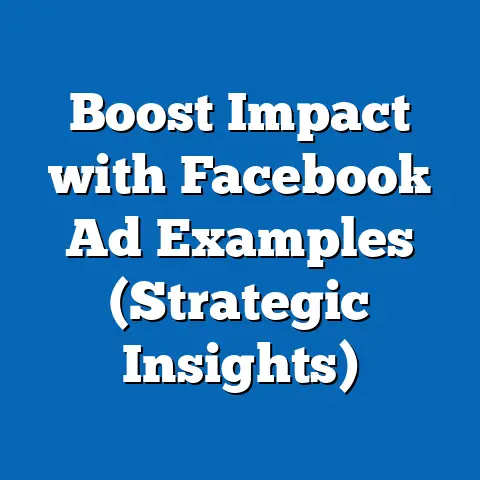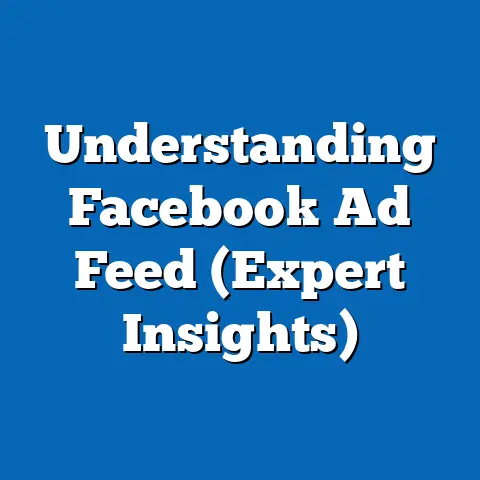Navigating Facebook Ad Policy Changes (Essential Insights)
As marketers, we often seek comfort in the familiar.
We find solace in platforms we know, tools we understand, and strategies that have proven successful.
For many businesses, Facebook advertising has become that source of comfort.
I’ve seen countless entrepreneurs and established brands alike build thriving businesses on the back of well-crafted Facebook ad campaigns.
The platform’s reach is unparalleled, the targeting options are granular, and the potential for ROI is undeniable.
But what happens when that comfort is disrupted?
What happens when the rules of the game change?
That’s the reality of Facebook advertising – it’s a dynamic landscape, constantly evolving, and frequently subject to policy updates.
I remember working with a client in the health and wellness space who had built a successful lead generation campaign targeting specific demographics interested in fitness.
Overnight, a policy change regarding health-related advertising practically crippled their campaign.
The initial panic was palpable, but it forced us to rethink our approach, explore new targeting options, and ultimately, develop a more sustainable and compliant strategy.
The truth is, clinging to outdated strategies in the face of policy changes is a recipe for disaster.
Understanding, adapting to, and even anticipating these changes is not just a necessity; it’s a competitive advantage.
In this guide, I’ll walk you through the essential insights you need to navigate the ever-evolving world of Facebook Ad Policies, ensuring you maintain that crucial comfort and continue to run successful campaigns.
Section 1: Understanding Facebook Ad Policies
Think of Facebook Ad Policies as the guardrails of the advertising highway.
They’re in place to ensure a safe, respectful, and trustworthy environment for both users and advertisers.
Without these guidelines, the platform would be overrun with misleading, harmful, and ultimately ineffective ads.
What are Facebook Ad Policies?
Facebook Ad Policies are a comprehensive set of rules that govern the types of content that can be advertised on the platform.
They cover a wide range of topics, from prohibited content like hate speech and illegal products to restricted content like alcohol and gambling, which require specific approvals and targeting limitations.
Why are they important?
These policies are crucial for several reasons:
- Maintaining User Trust: Facebook relies on user trust to maintain its relevance.
By prohibiting harmful or misleading content, they protect users from scams, misinformation, and offensive material. - Protecting Brand Safety: Brands advertising on Facebook want to ensure their ads appear in a safe and reputable environment.
Ad Policies help prevent their ads from being associated with inappropriate or offensive content. - Ensuring Legal Compliance: Facebook operates in a global environment with diverse legal and regulatory frameworks.
Ad Policies help ensure that advertising on the platform complies with relevant laws and regulations in different countries. - Preventing Misleading or Deceptive Practices: The policies protect consumers from deceptive or misleading advertising practices, which can damage trust in the platform and in the advertised products or services.
Types of Restricted or Prohibited Content:
The specific types of content restricted or prohibited by Facebook Ad Policies are extensive, but some key categories include:
- Misleading or Deceptive Content: Ads must be accurate and truthful.
Claims must be substantiated, and ads cannot mislead users about the product or service being offered. - Adult Content: Ads containing nudity, sexual content, or sexually suggestive material are generally prohibited.
- Hate Speech: Ads promoting violence, discrimination, or hatred based on race, ethnicity, religion, gender, sexual orientation, or other protected characteristics are strictly prohibited.
- Illegal Products or Services: Ads promoting illegal drugs, weapons, or other illegal products or services are prohibited.
- Controversial Content: Ads exploiting sensitive topics like natural disasters, political events, or personal tragedies are often restricted or prohibited.
- Personal Attributes: Ads cannot directly or indirectly assert or imply personal attributes like race, ethnicity, religion, age, sexual orientation, or medical condition.
Repercussions of Policy Violations:
The consequences of violating Facebook Ad Policies can be severe and can significantly impact your advertising efforts.
These can include:
- Ad Disapproval: The most common consequence is ad disapproval.
Your ad will not be shown to your target audience until the violation is corrected. - Account Suspension: Repeated or severe violations can lead to temporary or permanent suspension of your Facebook advertising account.
This can cripple your marketing efforts and result in significant financial losses. - Page Restriction: In some cases, Facebook may restrict the reach or functionality of your Facebook Page if it is associated with repeated policy violations.
- Legal Action: In extreme cases, Facebook may take legal action against advertisers who engage in egregious violations of Ad Policies.
Evolution of Facebook Ad Policies:
Facebook Ad Policies are not static; they evolve over time to address emerging issues and trends.
I’ve witnessed firsthand how the platform has adapted its policies to combat misinformation, protect user privacy, and address concerns about political advertising.
These changes often reflect broader societal shifts and regulatory pressures.
For example, the rise of deepfakes and AI-generated content has prompted Facebook to strengthen its policies against deceptive or manipulated media.
Similarly, increased scrutiny over data privacy has led to stricter rules regarding data collection and targeting.
Key Takeaway: Understanding Facebook Ad Policies is not just about avoiding penalties; it’s about building a sustainable and ethical advertising strategy.
Stay informed, comply with the rules, and prioritize user trust.
Section 2: Recent Changes in Facebook Ad Policies
The only constant is change, and that certainly applies to Facebook Ad Policies.
Staying abreast of these changes is crucial for any advertiser who wants to remain compliant and effective.
I’ve seen many businesses, particularly smaller ones, get caught off guard by seemingly minor policy updates, leading to ad disapprovals and wasted ad spend.
Here are some of the most significant recent changes in Facebook Ad Policies:
Enhanced Data Privacy Measures: In response to increasing concerns about data privacy, Facebook has implemented stricter rules regarding data collection and usage.
This includes limitations on the types of data that advertisers can collect and use for targeting, as well as increased transparency requirements.- Impact: Advertisers need to be more careful about the data they collect and how they use it.
They may need to obtain explicit consent from users before collecting certain types of data. -
Restrictions on Targeting Options: Facebook has restricted certain targeting options to prevent discrimination and ensure fairness.
This includes limitations on targeting based on age, gender, race, ethnicity, religion, and other protected characteristics. -
Impact: Advertisers need to be more mindful of their targeting choices and avoid using targeting options that could be discriminatory or exclusionary.
-
Stricter Rules on Political Advertising: In response to concerns about misinformation and foreign interference in elections, Facebook has implemented stricter rules on political advertising.
This includes requirements for political advertisers to disclose their identity and funding sources, as well as restrictions on the types of content that can be advertised. -
Impact: Political advertisers need to comply with these stricter rules to ensure their ads are approved and shown to their target audience.
-
Focus on Transparency and Authenticity: Facebook is increasingly focused on transparency and authenticity in advertising.
This includes requirements for advertisers to be upfront about their identity and the products or services they are promoting.
Facebook also has increased scrutiny of ads that use deceptive or misleading tactics. -
Impact: Advertisers need to be transparent and honest in their advertising.
They should avoid using deceptive or misleading tactics that could damage trust with users. -
Regulations on AI-Generated Content: With the rise of AI-generated content, Facebook has updated its policies to address the potential for misuse.
Ads that use AI-generated images, videos, or text must be clearly disclosed, and they cannot be used to spread misinformation or impersonate real people. -
Impact: Advertisers using AI-generated content need to be transparent about its use and ensure it complies with Facebook’s policies on misinformation and impersonation.
- Impact: Advertisers need to be more careful about the data they collect and how they use it.
Enhanced Data Privacy Measures: In response to increasing concerns about data privacy, Facebook has implemented stricter rules regarding data collection and usage.
This includes limitations on the types of data that advertisers can collect and use for targeting, as well as increased transparency requirements.
- Impact: Advertisers need to be more careful about the data they collect and how they use it.
They may need to obtain explicit consent from users before collecting certain types of data. Restrictions on Targeting Options: Facebook has restricted certain targeting options to prevent discrimination and ensure fairness.
This includes limitations on targeting based on age, gender, race, ethnicity, religion, and other protected characteristics.-
Impact: Advertisers need to be more mindful of their targeting choices and avoid using targeting options that could be discriminatory or exclusionary.
Stricter Rules on Political Advertising: In response to concerns about misinformation and foreign interference in elections, Facebook has implemented stricter rules on political advertising.
This includes requirements for political advertisers to disclose their identity and funding sources, as well as restrictions on the types of content that can be advertised.-
Impact: Political advertisers need to comply with these stricter rules to ensure their ads are approved and shown to their target audience.
Focus on Transparency and Authenticity: Facebook is increasingly focused on transparency and authenticity in advertising.
This includes requirements for advertisers to be upfront about their identity and the products or services they are promoting.
Facebook also has increased scrutiny of ads that use deceptive or misleading tactics.Impact: Advertisers need to be transparent and honest in their advertising.
They should avoid using deceptive or misleading tactics that could damage trust with users.Regulations on AI-Generated Content: With the rise of AI-generated content, Facebook has updated its policies to address the potential for misuse.
Ads that use AI-generated images, videos, or text must be clearly disclosed, and they cannot be used to spread misinformation or impersonate real people.-
Impact: Advertisers using AI-generated content need to be transparent about its use and ensure it complies with Facebook’s policies on misinformation and impersonation.
Restrictions on Targeting Options: Facebook has restricted certain targeting options to prevent discrimination and ensure fairness.
This includes limitations on targeting based on age, gender, race, ethnicity, religion, and other protected characteristics.
Impact: Advertisers need to be more mindful of their targeting choices and avoid using targeting options that could be discriminatory or exclusionary.
Stricter Rules on Political Advertising: In response to concerns about misinformation and foreign interference in elections, Facebook has implemented stricter rules on political advertising.
This includes requirements for political advertisers to disclose their identity and funding sources, as well as restrictions on the types of content that can be advertised.
Impact: Political advertisers need to comply with these stricter rules to ensure their ads are approved and shown to their target audience.
Focus on Transparency and Authenticity: Facebook is increasingly focused on transparency and authenticity in advertising.
This includes requirements for advertisers to be upfront about their identity and the products or services they are promoting.
Facebook also has increased scrutiny of ads that use deceptive or misleading tactics.
Impact: Advertisers need to be transparent and honest in their advertising.
They should avoid using deceptive or misleading tactics that could damage trust with users.
Regulations on AI-Generated Content: With the rise of AI-generated content, Facebook has updated its policies to address the potential for misuse.
Ads that use AI-generated images, videos, or text must be clearly disclosed, and they cannot be used to spread misinformation or impersonate real people.
Impact: Advertisers using AI-generated content need to be transparent about its use and ensure it complies with Facebook’s policies on misinformation and impersonation.
Impact on Different Industries:
These policy changes have a significant impact on different industries:
- Healthcare: Stricter rules on health-related advertising require advertisers to be more careful about the claims they make and the targeting options they use.
- Finance: Increased scrutiny of financial advertising requires advertisers to be more transparent about the risks associated with their products or services.
- E-commerce: Enhanced data privacy measures require e-commerce advertisers to be more careful about the data they collect and use for targeting.
- Political Advertising: Stricter rules on political advertising require political advertisers to disclose their identity and funding sources.
Rationale Behind the Changes:
These policy changes reflect Facebook’s response to regulatory pressures and public scrutiny.
The platform faces increasing pressure from governments and advocacy groups to address concerns about data privacy, misinformation, and discrimination.
By implementing these policy changes, Facebook aims to demonstrate its commitment to creating a safe, trustworthy, and fair advertising environment.
Case Studies:
Here are a couple of examples of how businesses have successfully adapted to these changes:
- Example 1: A Healthcare Provider: A healthcare provider adapted to stricter rules on health-related advertising by focusing on providing informative and educational content rather than making direct claims about their services.
They also diversified their targeting options to reach a broader audience. - Example 2: An E-commerce Business: An e-commerce business adapted to enhanced data privacy measures by obtaining explicit consent from users before collecting certain types of data.
They also invested in first-party data strategies to reduce their reliance on third-party data.
Key Takeaway: Stay informed about recent changes in Facebook Ad Policies, understand how these changes impact your industry, and adapt your advertising strategies accordingly.
Section 3: Strategies for Adapting to Policy Changes
Adapting to policy changes doesn’t have to be a reactive scramble.
By implementing proactive strategies, you can minimize disruption and even turn these changes into opportunities.
I always tell my clients that being agile and informed is key to thriving in the ever-shifting digital landscape.
Stay Informed:
- Follow Facebook’s Business Blog: This is the official source for announcements about policy changes, new features, and best practices.
Subscribe to their email newsletter to receive updates directly in your inbox. - Join Relevant Groups: There are numerous Facebook groups and online communities dedicated to Facebook advertising.
These groups are a great place to stay informed about policy changes and share insights with other advertisers. - Monitor Industry News: Keep an eye on industry news and publications that cover Facebook advertising.
These sources often provide analysis and commentary on policy changes. - Regularly Review the Facebook Ad Policies: Make it a habit to regularly review the official Facebook Ad Policies to ensure you are up-to-date on the latest requirements.
- Follow Facebook’s Business Blog: This is the official source for announcements about policy changes, new features, and best practices.
-
Regularly Review and Update Ad Content:
- Conduct Regular Audits: Regularly audit your existing ad campaigns to ensure that your ad content aligns with current policies.
- Update Outdated Content: Update any outdated or non-compliant content to reflect the latest policy changes.
- Review Targeting Options: Review your targeting options to ensure that they are still compliant with Facebook’s targeting restrictions.
Utilize Facebook’s Advertising Tools:
- Ad Preview Tool: Use the Ad Preview Tool to see how your ad will look on different devices and placements.
This can help you identify potential issues early in the campaign process. - Policy Help Center: The Policy Help Center provides detailed information about Facebook Ad Policies and how to comply with them.
- Facebook Business Suite: Leverage Facebook Business Suite to manage your ad campaigns, track performance, and stay informed about policy updates.
- Ad Preview Tool: Use the Ad Preview Tool to see how your ad will look on different devices and placements.
Test Ads in Small Batches:
- Run A/B Tests: Run A/B tests to compare different ad creatives and targeting options.
This can help you identify which ads are most effective and compliant. - Monitor Performance Closely: Monitor the performance of your ads closely to identify any potential issues.
If you notice that an ad is being disapproved or has low engagement, review the ad content and targeting options to ensure they are compliant. - Gather Feedback: Gather feedback from your target audience to understand how they perceive your ads.
This can help you identify any potential issues that you may have missed.
- Run A/B Tests: Run A/B tests to compare different ad creatives and targeting options.
-
Build Flexibility into Your Ad Strategies:
- Diversify Your Ad Formats: Experiment with different ad formats to see which ones resonate best with your target audience.
- Explore Different Targeting Options: Explore different targeting options to reach a broader audience.
- Develop Multiple Ad Creatives: Develop multiple ad creatives to ensure that you have a variety of options to choose from.
- Have a Contingency Plan: Have a contingency plan in place in case your ads are disapproved or your account is suspended.
Stay Informed:
- Follow Facebook’s Business Blog: This is the official source for announcements about policy changes, new features, and best practices.
Subscribe to their email newsletter to receive updates directly in your inbox. - Join Relevant Groups: There are numerous Facebook groups and online communities dedicated to Facebook advertising.
These groups are a great place to stay informed about policy changes and share insights with other advertisers. - Monitor Industry News: Keep an eye on industry news and publications that cover Facebook advertising.
These sources often provide analysis and commentary on policy changes. - Regularly Review the Facebook Ad Policies: Make it a habit to regularly review the official Facebook Ad Policies to ensure you are up-to-date on the latest requirements.
Regularly Review and Update Ad Content:
- Conduct Regular Audits: Regularly audit your existing ad campaigns to ensure that your ad content aligns with current policies.
- Update Outdated Content: Update any outdated or non-compliant content to reflect the latest policy changes.
- Review Targeting Options: Review your targeting options to ensure that they are still compliant with Facebook’s targeting restrictions.
Utilize Facebook’s Advertising Tools:
- Ad Preview Tool: Use the Ad Preview Tool to see how your ad will look on different devices and placements.
This can help you identify potential issues early in the campaign process. - Policy Help Center: The Policy Help Center provides detailed information about Facebook Ad Policies and how to comply with them.
- Facebook Business Suite: Leverage Facebook Business Suite to manage your ad campaigns, track performance, and stay informed about policy updates.
Test Ads in Small Batches:
- Run A/B Tests: Run A/B tests to compare different ad creatives and targeting options.
This can help you identify which ads are most effective and compliant. - Monitor Performance Closely: Monitor the performance of your ads closely to identify any potential issues.
If you notice that an ad is being disapproved or has low engagement, review the ad content and targeting options to ensure they are compliant. - Gather Feedback: Gather feedback from your target audience to understand how they perceive your ads.
This can help you identify any potential issues that you may have missed.
Build Flexibility into Your Ad Strategies:
- Diversify Your Ad Formats: Experiment with different ad formats to see which ones resonate best with your target audience.
- Explore Different Targeting Options: Explore different targeting options to reach a broader audience.
- Develop Multiple Ad Creatives: Develop multiple ad creatives to ensure that you have a variety of options to choose from.
- Have a Contingency Plan: Have a contingency plan in place in case your ads are disapproved or your account is suspended.
Key Takeaway: Proactively adapt to policy changes by staying informed, regularly reviewing and updating your ad content, utilizing Facebook’s advertising tools, testing ads in small batches, and building flexibility into your ad strategies.
Section 4: The Future of Facebook Ad Policies
Predicting the future is never easy, but by analyzing current trends and industry movements, we can make informed speculations about the future of Facebook Ad Policies.
I believe that the future of Facebook advertising will be shaped by a few key factors:
AI in Advertising: Artificial intelligence is already playing a significant role in Facebook advertising, and its influence is only going to grow in the future.
AI is being used to automate tasks, improve targeting, and personalize ad experiences.
However, AI also raises ethical concerns about bias, transparency, and accountability.- Potential Future Trend: Facebook may implement stricter rules on the use of AI in advertising to address these ethical concerns.
This could include requirements for advertisers to disclose when they are using AI-generated content and to ensure that their AI algorithms are not biased. -
Growing Emphasis on User Privacy: Data privacy is a major concern for consumers, and governments are increasingly regulating how companies collect and use data.
Facebook is responding to these pressures by implementing stricter data privacy measures. -
Potential Future Trend: Facebook may continue to strengthen its data privacy policies in the future.
This could include giving users more control over their data and limiting the types of data that advertisers can collect and use for targeting. -
Increased Regulation: Governments around the world are increasingly scrutinizing Facebook and other tech companies.
This scrutiny is likely to lead to increased regulation of the advertising industry. -
Potential Future Trend: Facebook may face increased regulation of its advertising practices in the future.
This could include restrictions on the types of content that can be advertised, requirements for greater transparency, and increased enforcement of existing regulations. -
The Metaverse: As the metaverse becomes more mainstream, Facebook is likely to explore new advertising opportunities in this virtual world.
However, advertising in the metaverse also raises new challenges, such as how to ensure user privacy and prevent harmful content. -
Potential Future Trend: Facebook may develop new ad policies specifically for the metaverse.
These policies could address issues such as user privacy, data security, and the prevention of harmful content.
- Potential Future Trend: Facebook may implement stricter rules on the use of AI in advertising to address these ethical concerns.
AI in Advertising: Artificial intelligence is already playing a significant role in Facebook advertising, and its influence is only going to grow in the future.
AI is being used to automate tasks, improve targeting, and personalize ad experiences.
However, AI also raises ethical concerns about bias, transparency, and accountability.
- Potential Future Trend: Facebook may implement stricter rules on the use of AI in advertising to address these ethical concerns.
This could include requirements for advertisers to disclose when they are using AI-generated content and to ensure that their AI algorithms are not biased. Growing Emphasis on User Privacy: Data privacy is a major concern for consumers, and governments are increasingly regulating how companies collect and use data.
Facebook is responding to these pressures by implementing stricter data privacy measures.Potential Future Trend: Facebook may continue to strengthen its data privacy policies in the future.
This could include giving users more control over their data and limiting the types of data that advertisers can collect and use for targeting.Increased Regulation: Governments around the world are increasingly scrutinizing Facebook and other tech companies.
This scrutiny is likely to lead to increased regulation of the advertising industry.Potential Future Trend: Facebook may face increased regulation of its advertising practices in the future.
This could include restrictions on the types of content that can be advertised, requirements for greater transparency, and increased enforcement of existing regulations.The Metaverse: As the metaverse becomes more mainstream, Facebook is likely to explore new advertising opportunities in this virtual world.
However, advertising in the metaverse also raises new challenges, such as how to ensure user privacy and prevent harmful content.Potential Future Trend: Facebook may develop new ad policies specifically for the metaverse.
These policies could address issues such as user privacy, data security, and the prevention of harmful content.
Growing Emphasis on User Privacy: Data privacy is a major concern for consumers, and governments are increasingly regulating how companies collect and use data.
Facebook is responding to these pressures by implementing stricter data privacy measures.
Potential Future Trend: Facebook may continue to strengthen its data privacy policies in the future.
This could include giving users more control over their data and limiting the types of data that advertisers can collect and use for targeting.
Increased Regulation: Governments around the world are increasingly scrutinizing Facebook and other tech companies.
This scrutiny is likely to lead to increased regulation of the advertising industry.
Potential Future Trend: Facebook may face increased regulation of its advertising practices in the future.
This could include restrictions on the types of content that can be advertised, requirements for greater transparency, and increased enforcement of existing regulations.
The Metaverse: As the metaverse becomes more mainstream, Facebook is likely to explore new advertising opportunities in this virtual world.
However, advertising in the metaverse also raises new challenges, such as how to ensure user privacy and prevent harmful content.
Potential Future Trend: Facebook may develop new ad policies specifically for the metaverse.
These policies could address issues such as user privacy, data security, and the prevention of harmful content.
How Advertisers Can Prepare:
To prepare for these potential changes, advertisers should:
- Build Flexibility into Their Ad Strategies: Be prepared to adapt your ad strategies quickly in response to policy changes.
- Stay Vigilant: Keep an eye on industry news and publications to stay informed about emerging trends and regulatory developments.
- Embrace New Technologies: Experiment with new technologies, such as AI and virtual reality, to see how they can be used to improve your advertising efforts.
- Prioritize User Trust: Focus on building trust with your target audience by being transparent, honest, and respectful in your advertising.
Key Takeaway: The future of Facebook Ad Policies is uncertain, but by staying vigilant, building flexibility into your ad strategies, and prioritizing user trust, you can prepare for whatever changes may come.
Conclusion
We started this journey by talking about comfort – that sense of security we find in familiar platforms and proven strategies.
And while the ever-changing landscape of Facebook Ad Policies can feel unsettling, I hope this guide has shown you that these changes don’t have to be a source of anxiety.
Instead, they can be viewed as opportunities for growth, innovation, and ultimately, a more sustainable and ethical approach to advertising.
Remember that adapting to these changes is not just about avoiding penalties; it’s about building a stronger, more resilient business.
By staying informed, being proactive, and prioritizing user trust, you can navigate the evolving world of Facebook ads with confidence.
So, embrace the change, stay curious, and never stop learning.
The world of Facebook advertising is constantly evolving, and the ability to adapt will be a key competitive advantage.
Now go forth and conquer the ever-evolving world of Facebook ads with agility, awareness, and a proactive mindset!






